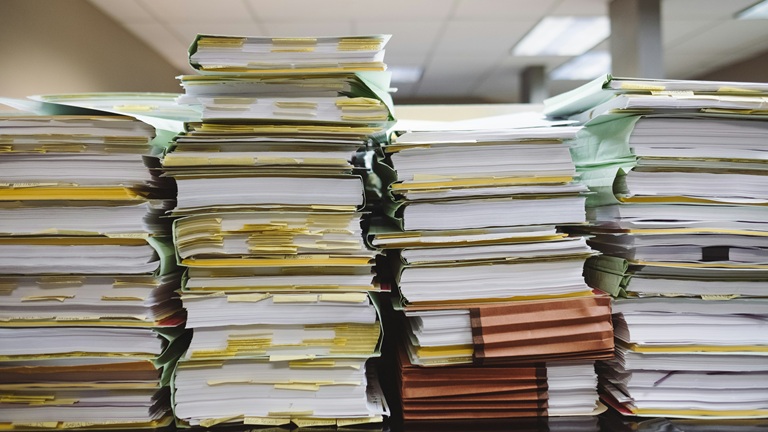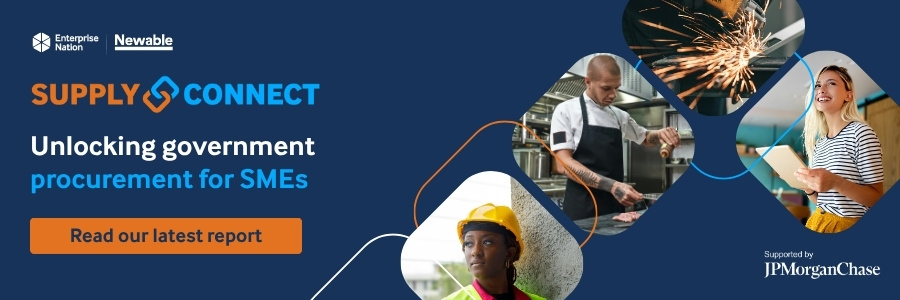Modern slavery statements: What small suppliers need to know
)
Posted: Wed 26th Nov 2025
14 min read
Every business that works with government has a role in keeping supply chains ethical. That includes the smallest suppliers.
Modern slavery isn't something most business owners expect to encounter, yet it can exist anywhere that goods or services are produced under pressure or without proper oversight.
When a public buyer awards a contract, they want to know that the businesses involved take this issue seriously and can show how they manage risk. A modern slavery statement is a simple way to explain that.
If you're preparing to enter public procurement, having a statement ready can save time and strengthen your credibility. It also shows that your business understands its responsibilities and values fair treatment for everyone in the supply chain.
This blog explains what a modern slavery statement is, who needs one and how to create it in a way that fits your business.
It's part of Ready to Supply, our series to helps small firms build the knowledge and documents they need to work confidently with government.
What a modern slavery statement is
A modern slavery statement is a written explanation of the steps your business takes to prevent modern slavery in any part of its work. It sets out:
how you operate
how you choose suppliers
how you make sure that people involved in delivering your services are treated fairly
A statement usually covers your structure, your suppliers and any processes you follow to spot concerns. It may also outline how you train staff and how you handle it if someone raises a potential issue.
In practice, the statement acts as a simple record of the safeguards you already use. For many small businesses, these safeguards are part of normal good practice.
Writing them down helps you communicate them to buyers in a clear and reliable way.
The statement doesn't need to be technical or long. Public buyers are looking for clarity.
They want to understand how you approach risk and how you keep an eye on the suppliers you use. Even a short document can meet this need if it reflects your business accurately.
The Modern Slavery Act 2015
Under the Modern Slavery Act 2015, large organisations with a turnover above £36 million must publish this statement each year.
Smaller businesses don't have a legal duty to do this, but will likely be asked for a statement when applying for public contracts.
This is because government buyers have a duty to check that every supplier in a chain understands the issue and takes reasonable steps to address it.
Why small businesses need a modern slavery statement
Public sector buyers expect every supplier in their chain to follow ethical standards.
Even if your business is small, you may be asked to show how you prevent exploitation in your operations and in the suppliers you rely on. A modern slavery statement helps you do that.
Many tenders include questions on social responsibility. Having a statement ready allows you to respond quickly.
It also shows that you understand the expectations that come with public work. Buyers want to see that you've taken the time to think about your supply chain and that you can explain how you manage risk.
Some small firms assume they don't need this document because they only work with UK suppliers or run a simple operation. Public buyers don't make this assumption.
They need written evidence to show that every supplier meets the same basic standard. A short statement is often enough to satisfy this requirement.
The main benefits
In our Supply Connect report 2025, we found that many small businesses miss out on opportunities when they haven't prepared key documents in advance.
Modern slavery statements are one of the items that buyers often request early in the process. Having yours ready can avoid delays and help you stay competitive.
A statement also supports your reputation. Clients and partners may ask for it as part of their own checks. Sharing a clear explanation of your practices builds confidence and helps others understand how you operate.
If you're new to public procurement, this document can feel unfamiliar, but it is a manageable step. Most small firms already work in ways that line up with the principles of the Modern Slavery Act. The statement simply brings those practices together in one place.
What to include in your modern slavery statement
A modern slavery statement should give a clear picture of how your business works and how you manage risk.
The language doesn't have to be formal or complicated. A simple structure helps buyers understand your approach quickly.
What matters most is that the information is specific to your business and easy to follow. A two-page statement is often enough for a small supplier.
You can organise your statement into a few short sections. Each section can be brief.
1. Business overview
Start with a brief description of your business. Include what you do, the size of your team and where you operate. This gives buyers context and helps them understand the scale of your supply chain.
2. Summary of your supply chain
Describe the types of suppliers you use. You don't need to list every company. A general outline is enough.
For example, you might mention equipment suppliers, freelance specialists or manufacturers. Include where they're based if you know this.
3. Risk assessment and due diligence
Explain how you choose suppliers and what you look for when you work with them. Many small firms select suppliers they know and trust. If this is the case, you can say so.
If you check any certifications or policies, mention that too. Buyers want to see that you pay attention to who you work with.
4. Policies and practices
If your business has any policies linked to fair treatment or recruitment, you can refer to them here. This might include HR policies or simple house rules that guide how you treat staff and contractors.
You don't need to create new documents. Use what you already have.
5. Training and awareness
Set out any steps you take to make sure your team understands the issue of modern slavery.
This could be a short discussion during onboarding, reading official guidance or joining a training session. Even small actions show that you take awareness seriously.
6. Future plans
End with a note on how you plan to review or improve your approach. This might involve checking suppliers more regularly or updating your policy as your business grows.
Buyers value steady progress and openness about areas you aim to strengthen.

How to create a modern slavery statement
Creating the statement is straightforward once you've gathered the information you need.
Most small businesses can complete one without specialist support, especially if they keep their supply chain simple.
1. Start by listing the suppliers you use
This doesn't need to be a full audit. Just note the main companies or individuals you rely on and where they sit in your work.
This gives you a clear view of your supply chain and helps you identify any areas that need attention.
2. Look at how you choose suppliers
If you tend to work with trusted contacts or long-term partners, say so.
If you check reviews, ask for references or look for certain standards, include that information in your notes. These details will help shape the section on due diligence.
3. Draft your statement
Once you have this background, draft your statement using the structure outlined above.
Keep the language plain. Write in a way that a staff member, customer or subcontractor could read without extra explanation. Buyers prefer clear, direct text that reflects real practice.
4. Review the statement
After you finish the draft, review it with your team or another decision maker in your business. Make sure it describes your processes accurately.
If something feels unclear, simplify it. A shorter and honest statement is more useful than a long one that tries to cover everything at once.
5. Make it easy to access
Once the statement is complete, save it in a place where you can access it quickly. Buyers may ask for it early in a tender process.
If you have a website, you can create a page that hosts your statement. This is useful for transparency and gives larger contractors a simple way to confirm your practices.
6. Schedule yearly updates
Review your statement once a year, or sooner if your business changes. A brief update keeps it relevant and helps you maintain a clear record of your efforts.
How public buyers use this information
Public buyers review modern slavery statements to understand how suppliers manage risk.
They look for clear evidence that a business pays attention to the people involved in its operations and supply chain. This helps them meet their own responsibilities under procurement law.
When a buyer reads your statement, they're checking for a couple of key things.
They want to see that you know who your suppliers are and that you've thought about the conditions in which work takes place.
They also want to see that you have a process for raising concerns and that your team understands what to do if something doesn't seem right.
Buyers look for awareness and steady, practical steps. A simple statement that reflects your real practices is more useful to them than a long, complex document filled with jargon.
The information in your statement helps buyers compare suppliers and make informed decisions. It also supports the due diligence they must complete before awarding a contract.
When your statement is clear and well presented, it becomes easier for them to assess your readiness to supply.
If you work with a larger contractor as a subcontractor, they may also ask for your statement. Many Tier 1 suppliers (companies that provide products or components to the final customer directly) have their own checks to complete.
Sharing your document early in the discussion helps them verify your suitability and can speed up the onboarding process.
Public buyers rely on transparency. A modern slavery statement gives them the detail they need to feel confident in your business.
It also shows that you take your responsibilities seriously and understand the standards expected in public procurement.
Conclusion
A modern slavery statement is a simple document with an important purpose.
It helps you explain how your business operates, how you choose suppliers and how you promote fair treatment throughout your work.
Public buyers look for this information early in the procurement process, and having a statement ready shows that you understand their expectations.
If you're building your readiness for public sector work, this document is worth preparing now.
It saves time when opportunities arise and helps buyers feel confident in choosing you.
People also read
Download your free guide to win contracts
Public sector procurement can seem out of reach for small businesses. But with this guide from Supply Connect, it's more accessible than ever. Get the free guide now
Get business support right to your inbox
Subscribe to our newsletter to receive business tips, learn about new funding programmes, join upcoming events, take e-learning courses, and more.
Start your business journey today
Take the first step to successfully starting and growing your business.
Join for free


